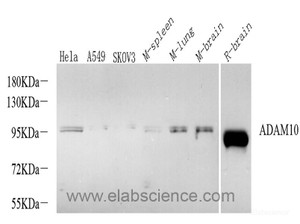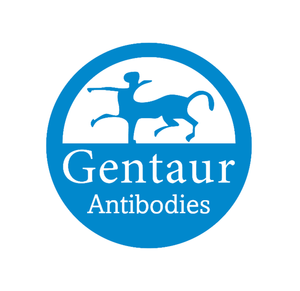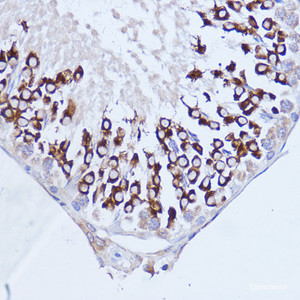CD156c Polyclonal Antibody | G-AB-02179
Gentaur Antibodies
- SKU:
- G-AB-02179
- Availability:
- 3 to 5 Working Days
- Host:
- Rabbit
- Reactivity:
- Human, Mouse, Rat
CD156c Polyclonal Antibody | G-AB-02179 | Gentaur Antibodies
Overview: Members of the ADAM family are cell surface proteins with a unique structure possessing both potential adhesion and protease domains. This gene encodes and ADAM family member that cleaves many proteins including TNF-alpha and E-cadherin. Cleaves the membrane-bound precursor of TNF-alpha at '76-Ala-|-Val-77' to its mature soluble form. Responsible for the proteolytical release of soluble JAM3 from endothelial cells surface. Responsible for the proteolytic release of several other cell-surface proteins, including heparin-binding epidermal growth-like factor, ephrin-A2 and for constitutive and regulated alpha-secretase cleavage of amyloid precursor protein (APP) .
Category Type: Polyclonal Antibody
Research Areas: Cancer, Cell Biology, Signal Transduction
Synonyms: A disintegrin and metalloprotease domain 10, A disintegrin and metalloproteinase domain 10, AD 10, AD10, AD18, ADA10, ADAM 10, ADAM metallopeptidase domain 10, ADAM10, CD 156c, CD156c, CD156c antigen, CDw156, disintegrin and metalloproteinase domain containing protein 10, Disintegrin and metalloproteinase domain-containing protein 10, HsT 18717, HsT18717, Kuz, Kuzbanian, Kuzbanian protein homolog, Kuzbanian, Drosophila, homolog of, MADM, Mammalian disintegrin metalloprotease, Mammalian disintegrin-metalloprotease, RAK
Reactivity: Human, Mouse, Rat
Host: Rabbit
Isotype: IgG
Gene ID:
Accession #: BC126253
Clonality: Polyclonal
Immunogen: Recombinant protein of human ADAM10
Clone #:
Conjugation: Unconjugated
Swissprot: O14672
Santa Cruz: sc-16523/sc-31853/sc-31855/sc-16524/sc-25578
Calculated MW: 84 kDa
Observed MW:
Concentration: 0.3 mg/mL
Buffer: PBS with 0.05% sodium azide and 50% glycerol, PH7.4
Purification method: Affinity purification
Application: WB, IHC, ELISA
Dilution: WB 1:200-1:1000, IHC 1:25-1:100
Storage: Store at -20°C. Avoid freeze / thaw cycles.














